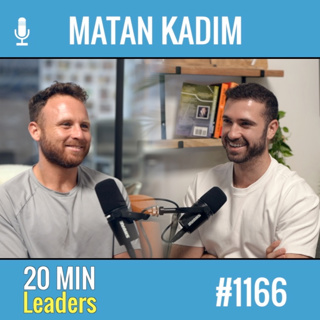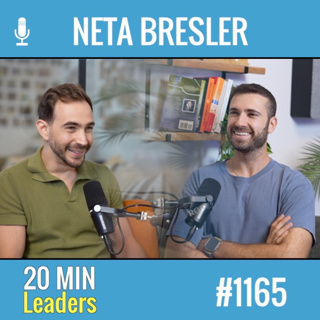
Ep1171: Fernando Dominguez Pinuaga: Quantum Meets AI
Fernando Dominguez Pinuaga shares his journey from energy systems to Google X, where he learned to think in true moonshot scale before joining SandboxAQ. At the crossroads of AI and quantum physics, he leads initiatives that are redefining cybersecurity and scientific computing.He explains how adversaries are already stealing encrypted information today through store-now, decrypt-later attacks — making quantum-era risk a current problem, not a future one. Fernando outlines the path toward crypto-agility, encryption inventorying, and modernization strategies that governments, banks, and enterprises must now adopt.Beyond security, he highlights the rise of physics-based AI models capable of accelerating breakthroughs in drug discovery, materials science, energy systems, and financial modeling — areas where classical AI struggles. Fernando frames this moment as the beginning of a new computational era, where quantum principles and AI jointly shape the next industrial wave.
1 Jan 23min

Ep1169: Lauren Freund: Engagement Over Reach
Lauren Freund has spent the last few years inside her dream company, leading social media and influencer marketing at Canva. She describes why traditional influencer playbooks—optimizing for follower counts and reach—are increasingly outdated, and why she now screens creators for deep engagement, relevance, and the ability to truly carry Canva’s message. For her, the messenger is as important as the message, and influencer feedback is anchored in objectives and CTAs, not rewriting their voice. On the brand side, she runs every idea through a simple but demanding filter: why share and why care—why the company should post it, and why the audience would genuinely care. From there, she uses each platform’s “success signals,” like shares/saves or time-on-post, to decide when to use video and when carousels outperform. Lauren closes by reflecting on working at a product she genuinely loves and how the ever-changing worlds of social and AI keep the work exciting and experimental.#20MinuteLeaders #SocialMediaStrategy #InfluencerMarketing #CreatorEconomy
18 Dec 202520min

Ep1168: Anya Law: Actionable Social Listening
Coming from years of manual social monitoring in marketing roles, Anya Law saw how expensive and ineffective traditional social listening was for startups. Meeting her co-founder at Atlanta Tech Village, she joined PitchGhost to transform a simple Twitter scraper into a full prompt-based, actionable social listening platform. The team discovered their ICP through trial and error—moving from solo founders to multi-person GTM teams who needed context-aware posts, sentiment filters, and response automation. With LinkedIn support as a major differentiator, PitchGhost is now expanding integrations, APIs, and CRM workflows to become a core part of the modern RevOps stack. Anya’s story is one of solving her own pain, refining personas, and building a tool that helps teams act—not just monitor. #SocialListening #GTMStrategy #MarketingAutomation
15 Dec 202521min

Ep1167: Daniel Adix: The Recovery Rebrand
Growing up in Wisconsin’s drinking culture, Daniel Adix launched LiQure to help people “feel good the next day.” After discovering DHM and developing a gummy-based recovery supplement, he navigated taste issues, manufacturing resets, FDA compliance, and the realities of CPG distribution. Rather than chasing ads, he built LiQure through festivals, bars, and targeted retail—landing Foxtrot Chicago as an early anchor. Daniel frames LiQure not as a party hack but as a performance-enhancing recovery brand that supports real-world consumers and modern wellness routines.
3 Dec 202521min

Ep1166 | Matan Kadim: Identity Drives Fitness
Matan Kadim’s path into fitness began with a personal struggle and grew into a career of coaching and international learning. He argues that real change comes not from short-term resolutions but from identity-level shifts: who you see yourself as. Training, he explains, is not just against comfort zones but against evolutionary programming for ease and safety. By reframing workouts as daily battles with comfort, Matan helps clients develop resilience, discipline, and joy in the process. His “simple but not easy” philosophy cuts through misinformation and fad culture, emphasizing consistency, sleep, nutrition, and growth mindset. For Matan, the gym is a microcosm of life—identity, habits, and resilience all align to shape who you become.
11 Nov 20251h 4min

Ep1165 | Neta Bresler: Mind Art for Tech Teams
Neta Bresler’s journey began with a childhood magic kit and evolved into a 1,500-student academy and global recognition as a top mentalist. Today, he reframes mentalism as “mind art”—a discipline that maps human blind spots and leverages them to teach, not just entertain. With stories like the “magic wand” blind spot and his red-to-purple team analogy, Neta explains how illusions translate into enterprise strategy. For him, certainty is the ultimate illusion, and breaking assumptions creates presence. He now works with tech companies on deception, perception, and product design, showing that the art of magic is really the science of human cognition.#20MinuteLeaders #MindArtInBusiness #CognitiveLeadership #TechTeamInnovation
10 Nov 202540min

AI & the Fifth Domain of Warfare: A Talk with Eyal Balicer, Cybersecurity Innovator & Thought Leader
By Michael Matias, CEO of Clarity and Forbes 30 Under 30 alumCybersecurity has entered a new domain—literally. As Eyal Balicer put it in our recent conversation: “Cyberspace is now the fifth domain of warfare.” But in this domain, the battleground isn’t just code. It’s control.Eyal brings a rare vantage point to the AI-cyber nexus—he’s held senior cybersecurity roles in the Israeli government, Fortune 100 companies like Citi, and top-tier venture capital. Our discussion centered on a growing truth: with the rise of agentic systems—AI entities that can act, decide, and evolve—the mission of cybersecurity is changing.“We are shifting from a world where intelligence was a scarce resource to one where that is not necessarily the case; true agency is becoming the new elusive driver of prosperity and growth,” Eyal explained. “The systems we are now securing are not just automated—they are autonomous, highly competent, and opaque. Traditional defenses cannot keep up.”It’s a shift I’ve seen firsthand at Clarity, where we build proactive defenses against deepfakes and AI-generated phishing. Just like Shahar Peled told me about agentic AI revolutionizing offensive testing, Eyal sees these agents redefining global threat models. The challenge isn’t identifying known threats—it’s safeguarding systems that learn, adapt, and act independently.And that requires a new security architecture.“An AI agent can have fluid permissions, context-based roles, and evolving identity,” he told me. “Conventional IAM just does not cut it anymore.” In that sense, Balicer echoes voices like Ron Nissim and Alon Jackson, who both called for a redefinition of identity management in the AI age.But Eyal's view goes broader: geopolitical. He sees cybersecurity not just as a business enabler, but as a pillar of national resilience. From financial systems to defense infrastructure, the stakes have never been higher. “The future will require autonomous cybersecurity—not just automated, pre-defined playbooks, but real-time, adaptive agents who reason and defend at the edge, with varying degrees of human intervention.”We discussed how the regulatory map only adds to the complexity. “The fragmentation across jurisdictions makes cross-border cybersecurity brittle,” Eyal warned. His point was clear: the only viable strategy is proactive, agentic, adaptable security. Not static controls. Not red-alert dashboards.The recent acquisition of Wiz by Google, he said, is just the beginning. “This will eventually lead to an entrepreneurial Cambrian explosion in cybersecurity,” Eyal predicted. And much like Dorit Dor told me, the organizations that survive will be those that move fast—and let AI lead the charge.As we closed, his advice was blunt: “Ignoring this revolution is not an option. AI evolves daily. Your security safeguards and controls should not lag behind.”My takeaway? Eyal isn’t just talking about new tools—he’s laying out a new doctrine.Agentic AI isn’t coming. It’s here. And if we don’t secure it now, we risk losing control of the systems that already make decisions for us.The future of cyber isn’t just proactive. It’s autonomous. And it’s already reshaping the balance of power.
14 Sep 202542min

Unlocking GRC Potential with AI: A Conversation with Yair Kuznitsov, CEO of Anecdotes
By Michael Matias, CEO of Clarity and Forbes 30 Under 30 alumThe intersection of Governance, Risk, and Compliance (GRC) and artificial intelligence (AI) marks one of today’s most significant business transformations. In my recent conversation with Yair Kuznitsov, an expert in AI and GRC, it became clear that GRC’s role within enterprises has fundamentally shifted, driven by rapid AI adoption.Kuznitsov, whose team spent the past year on rigorous AI research in the GRC domain, highlighted the critical role of proprietary data in achieving enterprise-grade accuracy. “It’s very difficult to create AI that addresses specific use cases with high accuracy without training it on highly specific and vertical datasets,” he explained. Proprietary data isn’t just helpful—it’s essential for the trust enterprises demand.Historically, GRC was seen as a gatekeeper—slowing innovation with rigid compliance requirements. Today, however, modern GRC teams are becoming enablers of innovation. As Kuznitsov put it: “Historically, GRC was a gatekeeper slowing innovation. Today, modern GRC teams enable innovation, ensuring trust remains intact.” This shift reflects the rising complexity created by global expansion, cloud adoption, and the proliferation of SaaS tools.The scale of risk is staggering. Gartner projects that by 2025, 85% of enterprises will operate mainly in the cloud, challenging traditional compliance frameworks. GRC functions must now assess regulations rapidly while supporting swift, secure market entry. AI is uniquely positioned to meet this demand—but only if accuracy reaches the 80–90% confidence enterprises require. That confidence, Kuznitsov emphasized, depends on training AI with proprietary, vertical datasets.At Clarity, we’ve seen firsthand how tailored AI models dramatically strengthen cybersecurity. AI doesn’t just upgrade compliance workflows—it transforms GRC from a reactive bottleneck into a proactive driver of innovation.Kuznitsov also underscored how traditional compliance, rooted in static documents, has become chaotic in the face of globalization and fast-paced tech adoption. AI addresses this chaos, automating assessments, policy checks, and risk monitoring at speeds previously unimaginable. Here again, the differentiator is proprietary data. By grounding AI in enterprise-specific datasets, organizations secure the accuracy needed to maintain trust. As Kuznitsov noted, “Vertical AI solutions achieve high value by providing tailored accuracy for specific enterprise use cases.”The lesson is clear: enterprises that embrace AI-driven GRC today will not just adapt, they’ll thrive. The evolution from passive gatekeeping to active enabling is no longer optional—it’s essential. Those that ignore this transformation risk being left behind in an increasingly complex regulatory landscape.Enterprises must urgently rethink their approach to GRC. The AI era demands dynamic, proactive, and precise compliance strategies, rooted in proprietary data and vertical AI solutions. The choice is stark: adopt AI-driven GRC to accelerate innovation and maintain trust, or remain stuck in outdated practices and growing risk.
14 Sep 202526min






















